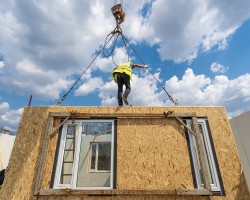Nick Cowley, Managing Director of Euramax Solutions, argues that modular construction quickly needs to become the norm if we've got any chance of meeting strict carbon reduction targets.
How we build houses wasn't a big topic of conversation at COP26. But it should've been.
The world's most powerful people recently gathered in Glasgow for the UN's 26th annual conference on climate change – the pivotal summits at which world leaders debate our strategy for preventing environmental breakdown.
It came amid increasingly dire warnings from scientists that current carbon reduction targets will see global temperatures rise a catastrophic 2.7 degrees Celsius by 2100 – over a degree hotter than the 1.5 degree limit the world's biggest polluters have committed to.
That means that as companies, industries and as a world, we're going to have to be even bolder when it comes to cutting carbon – and there's no way we'll be able to do that without radically changing the way we build the homes we live in.
Modular – the only way forward for construction
UK construction uses an estimated 400 million tonnes of materials every year. It generates an estimated 56 million tonnes of debris, and it's been suggested that roughly 30% of all construction material is wasted – with a huge environmental impact.
The way we build the vast majority of homes in 2021 just isn't compatible with a sustainable future.
It's been clear for years now, possibly even decades, that modular construction is the way forward. Now's the time for the world to wholeheartedly embrace it.
Why is modular a more sustainable way of doing things? First, let's recap what exactly modular construction is.
Modular building involves sections of a house – or 'modules' – being built on an assembly line in a factory environment. The walls, floors, roofs, doors, windows, wiring, plumbing, and ductwork are all fitted before it leaves the warehouse.
These modules are then transported to site on a flatbed truck, craned into position, placed on pre-set foundations then assembled into a finished building.
The benefits of this approach are enormous. It uses less energy. It wastes less materials. It results in far lower transportation emissions. It requires much less rework, thanks to more standardised and efficient processes. And the build time can be half that of traditional brick-built construction.
What's more, it opens up the possibility of recyclable buildings. Modules that are part of one building can eventually be repurposed as part of another one. Given that the US Environmental Protection Agency estimates that 90% of construction waste is accounted for by demolition, this could be a game-changer when it comes to cutting our sector's environmental impact.
Time to get specific
I said earlier that we think 30% of all construction materials are wasted. According to the Waste and Resources Action Plan, if the sector fully embraced modular, that could be cut to just 1.8%.
COP26 was much more focused on ensuring countries stick to their top-level commitments on cutting carbon than dealing with the nitty-gritty of how those reductions will actually be achieved – but if net zero by 2050 and limiting temperature rises to 1.5 degrees Celsius are ever going to be feasible objectives, we'll very quickly have to turn our attention to the specifics.
For more information, call Euramax Solutions on 0330 1340290 or visit www.euramaxuk.com
To Reach a Net-Zero World, We Need to Embrace Modular
8th March, 2022









